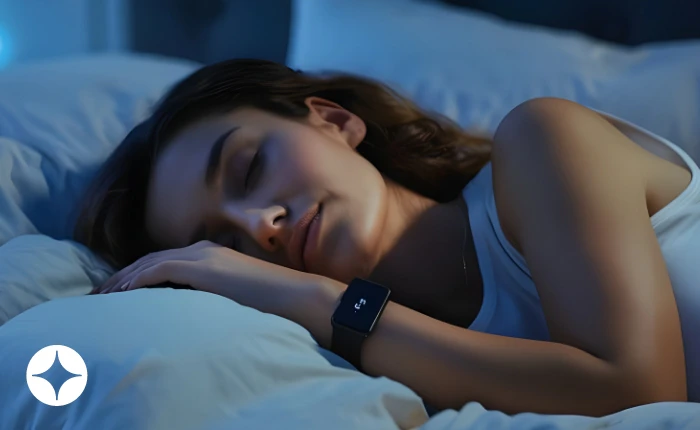
Obstructive sleep apnea (OSA)1 is a breathing disorder that causes intermittent cessations or decreases in airflow during a person's sleep. It affects an estimated 12% of the population, but many people with this condition go undiagnosed.
Efforts continue to increase awareness around sleep apnea and other sleep disorders to help mitigate the physical and mental health consequences related to untreated sleep apnea. Learn about the benefits and potential risks of home tests to discover if this option suits you.
Diagnosing Sleep Disorders
You may have sleep apnea if you experience common symptoms2 such as waking frequently at night, snoring, daytime sleepiness, headaches, or dry mouth in the morning. Undiagnosed sleep apnea can cause health problems, including anxiety and depression, falling asleep during the day, high blood pressure, and heart damage.
The traditional testing method for OSA is an in-lab sleep study3 called a polysomnogram (PSG). This test tracks your brain activity through sensors applied to your head and body. While overnight sleep studies are considered the most accurate diagnostic tool, at-home sleep tests are now available for some patients.
Advancements in Home Sleep Apnea Tests
Home sleep apnea tests (HSATs)4 provide a comfortable and private way to monitor breathing patterns, heart rate, and oxygen levels during sleep. You wear a portable breathing monitor overnight, which records your data and calculates a severity score based on the average number of apneas per hour. You must see your doctor for a sleep apnea pre-screening to obtain a prescription for the at-home test. A sleep specialist interprets your results once it's completed.
Ongoing technological advancements5 continue to improve capabilities and accuracy of at-home sleep assessments, potentially broadening their applicability in the future. Creating a simple yet effective home test is ideal for collecting accurate data, since most patients will sleep most normally in their own bed.
Pros of At-Home Sleep Tests
Eliminate the pressure of an in-lab sleep study and test from the comfort of your own home. At-home tests provide a variety of benefits:
- Convenience: Test at home instead of driving to a clinic.
- Comfort6: Sleep in your own bed.
- Accessibility: Have the test delivered right to your home.
- Cost-Effectiveness: Most at-home tests are covered by insurance.
- Shorter Wait Times: Get your test and results faster than in-lab studies.
Cons of At-Home Sleep Tests
Home sleep tests aren't right for everyone. They have several downsides:
- Limited Data Collection: In-lab tests diagnose additional sleep disorders or medical conditions.
- Potential for Inaccuracies: Errors or underestimating the severity7 of OSA can occur.
- Not Suitable for All Patients: Opt for an in-lab study if you have a complex medical history or needs.
Recent Developments in Sleep Monitoring Devices
Advancements in wearables and non-contact sleep monitoring technologies8 are emerging. Wearables like patches, in-ear devices, watches, rings, and headbands are worn on the body for up to 24 hours. Non-contact (nearables) like microphones, film recordings, and radar devices are placed close to the body and only used during sleep. Increased focus on wellness has also spurred companies such as Apple to incorporate features to detect sleep apnea in their Apple Watch.
Are At-Home Sleep Tests Right For Me?
While at-home sleep tests serve as a convenient and cost-effective method for diagnosing OSA, they are not yet comprehensive enough to replace in-lab sleep studies entirely. The choice between an at-home test and an in-lab study9 depends on your health profile and your doctor's recommendations.
An at-home test is an option if you're a healthy adult and your symptoms indicate that sleep apnea is the likely cause. In-lab testing is best if you have or suspect another medical condition beyond OSA. Talk to your doctor to discuss your personal medical history and symptoms to decide which one is best for you.
References
- Journal of Clinical Sleep Medicine – "Count on Sleep": An OSA awareness project update
- Cleveland Clinic – Sleep Apnea
- Johns Hopkins University – What Happens In a Sleep Study?
- Sleep Foundation – At-Home Sleep Apnea Tests
- Nox Medical – Technical Advancements in Home Sleep Tests
- Michigan Medicine – When Is a Home Sleep Apnea Test Appropriate?
- National Library of Medicine – Potential Underestimation of Sleep Apnea Severity by At-Home Kits: Rescoring In-Laboratory Polysomnography Without Sleep Staging
- National Library of Medicine – Technologies for sleep monitoring at home: wearables and nearables
- University Hospitals – Sleep Lab or Home Sleep Test: Which Is Right for Me?




